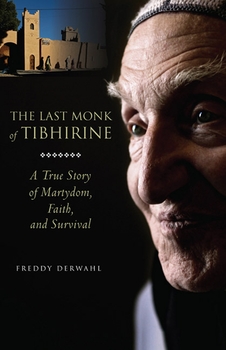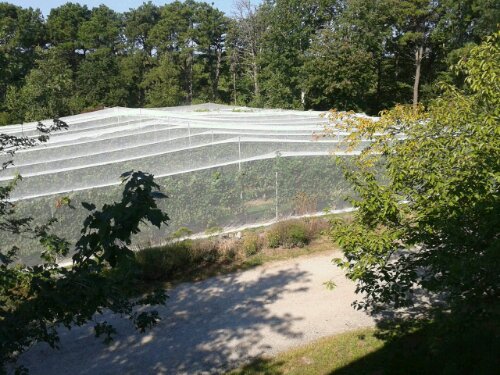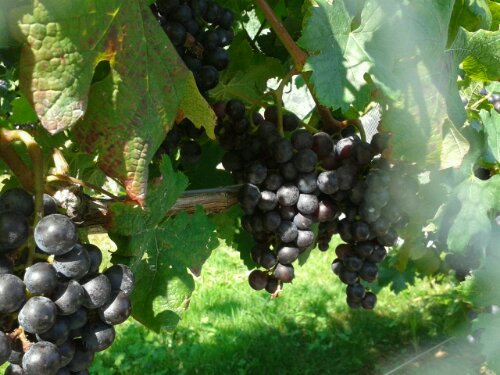As the first week of Advent begins Jesus urges us to “keep watch…”{ Mt 24:42}

As the first week of Advent begins Jesus urges us to “keep watch…”{ Mt 24:42}

In 1970, near a small fishing village on the shores of Cape Cod Bay, God called the Community of Jesus together—some 25 mostly Protestant Christians, who felt a common sense of vocation to live, pray, and work together. Today the Community of Jesus has grown into a contemporary Benedictine Monastery in the form of a modern ecumenical abbey comprised of people from many walks of life and varying occupations. Religious Sisters and Brothers and married families with children all live, work, and pray together. Many of the adults work at the Community’s Christian publishing house, Paraclete Press.
 I just finished reading the manuscript copy and what struck me the most was the humble commitment that led these monks to remain in Algeria and simply be present with their neighbors in a time of unchecked violence in their country. Their goal had never been to convert their Muslim neighbors – but to simply show Christ’s love and live alongside them. I have been thinking a lot about a portion of the last testament written by Prior Christian just before the abduction, where he says that he saw himself as an accomplice of evil in the world. He depicts it as “sitting down at the table of the sinners.” As it is described “all of us deserve part of the blame for everything that goes wrong in the family of mankind, and it is our duty to change this and to heal. If we neglect doing this, if we do not take action and carry out the task that we have been given, then we are jointly responsible for the result.”
I just finished reading the manuscript copy and what struck me the most was the humble commitment that led these monks to remain in Algeria and simply be present with their neighbors in a time of unchecked violence in their country. Their goal had never been to convert their Muslim neighbors – but to simply show Christ’s love and live alongside them. I have been thinking a lot about a portion of the last testament written by Prior Christian just before the abduction, where he says that he saw himself as an accomplice of evil in the world. He depicts it as “sitting down at the table of the sinners.” As it is described “all of us deserve part of the blame for everything that goes wrong in the family of mankind, and it is our duty to change this and to heal. If we neglect doing this, if we do not take action and carry out the task that we have been given, then we are jointly responsible for the result.”Actions speak louder than words in a way that is profound.

Lately, Gloriæ Dei Cantores’ chant recordings have received a lot of favorable attention. We’re thrilled, of course—we view Gregorian chant as the beloved “grandfather” of all western music, and it provides the heartbeat of our monastic vocation. “Seven times a day will I praise thee,” says the psalmist, and we endeavor to join him faithfully through the Liturgy of the Hours. The fruits of this opus Dei—this work of God—are sweet indeed.
Now I know that not everyone views chant as the “full contact sport” that we tend to engage in here in our monastery by the bay. The CDs most of our customers hear in the peaceful setting of home, car, or office, with those clean, smooth lines and (hopefully!) unified voices are generally only achieved after a lot of mutual knocking off of corners and filing down of rough patches amongst the Schola members—a challenging process, but in the end, always a cause for gratitude. As regular folks, we have experienced the innumerable benefits of worshiping daily through this vibrant form of sung prayer—the experience of unity, the seeming secret language of prayer, the sparks of inspiration that occur when the critical mechanism of the mind takes a break and the heart opens.

We know we’re not alone in finding these sparks, because Gloriæ Dei Cantores sings a lot of other music—the early masters like Josquin and Palestrina, up through Bach, Mozart, Rheinberger, Brahms, Liszt, Faure, Vaughan Williams, and the list goes on—and we’re always excited to find that thread of Gregorian chant that has managed to weave its way through the music of the centuries, still living and breathing, into today’s choral music.
So if you’ve been reluctant to stray too far from the purity of chant, we invite you venture out into the other choral treasures that Gloriæ Dei Cantores has come to know and love—Gregorian chant’s great-great-grandchildren, if you will. It’s a lineage and heritage worth exploring.
On Sunday, we’ll wear red to mark the start of the season of Pentecost. Why? To remember tongues as of fire that burned over the heads of Jesus’ earliest followers and friends.
Many of us, however, will remember with a splash of red what we’ll rarely experience: a rushing wind, tongues as of fire descending on each of us, and the capacity to speak out in a miraculous array of languages (Acts 2:1-13).
Still, there is something we can take away from Pentecost. In his commentary on this unlikely event, the apostle Peter, at the first Pentecost, dips into scripture to explain the method in God’s madness.
Before we look at what we can take away from Peter’s words, let me ask you to think about something: Peter had at hand any number of texts in the scriptures to explain this experience. He could have drawn a parallel between the powerful onrush of the spirit on the judges—Othniel, Gideon, Samson—to accentuate the power of the holy spirit to accomplish still more astonishing acts in history (Judges 3, 6, 13-15). He could have talked about the outpouring of the spirit, which transforms deserts into fertile gardens, and proclaim that God was now watering the arid spirituality of God’s people (Isaiah 44:3-5). He could have appealed to the descent of the spirit on the messiah, God’s anointed, and drawn from such a profound prophetic text that this new community would be the messianic leaven in the world, mediators of justice, guides to righteousness (Isaiah 11:1-9). He could have culled from Ezekiel’s vision of the valley of very many, very dry bones a promise of restoration and resurrection (Ezekiel 37).
Any number of these scriptural texts would have served Peter well. Any of them would have allowed Peter to see in this fiery band the future of the world. All of these are arresting images of renewal and liberation and leadership. Yet Peter picks this one, from a prophet whose predictions are pretty mundane — except for this astonishing word:
In the last days it will be, God declares,
that I will pour out my Spirit upon all flesh,
and your sons and your daughters shall prophesy,
and your young men shall see visions,
and your old men shall dream dreams.
Even upon my slaves, both men and women,
in those days I will pour out my Spirit;
And they shall prophesy (Acts 2:17–19, quoting Joel 2:28–29).
This is the church’s manifesto, its birthright, its destiny. The spirit turns society upside down. The spirit is poured out on old and young men, sons, too. But it is also poured out on daughters and slaves, both male and female. Anyone, anyone at all, top to bottom, east to west, male or female, can receive the spirit and prophesy. The spirit is not packaged neatly for the pious or privileged — the spirit is outpoured, indiscriminately.
Not all of us will experience the rush of a mighty wind, tongues as of fire on our heads, or the capacity to declare God’s actions in an array of languages, but we can participate in this vision, which tears the wineskins of conservatism — just what we should expect the spirit to do. The inclusion of slaves obliterates the rule of order. The inclusion of women, of daughters and female slaves, devastates the rule of men. Life as we know it explodes at Pentecost, in which the spirit is poured out on all flesh, and no less richly on female slaves than on powerful men.
If we choose to participate in this unsettling vision, we’ll unleash the explosive energy of Pentecost in our generation, just like Christians who’ve championed the unsettling work of the holy spirit long before our time. People like the renowned mid-19th-century Methodist preacher Phoebe Palmer, who insisted that the “promise of the Father,” Jesus’ reference to the holy spirit (Luke 24:49), inspired women with the power to proclaim Jesus Christ.1 She, like many before and after her, saw this promise fulfilled by the events of Pentecost:
God has, in all ages of the Church, called some of his handmaids to eminent publicity and usefulness; and when the residue of the Spirit is poured out, and the millennium glory ushered in, the prophecy of Joel being fully accomplished in all its glory, then, probably, there be such a sweet blending into one spirit … that the wonder will then be, that the exertions of pious females to bring souls to Christ should ever have been opposed or obstructed.2
The holy spirit, according to the story of Pentecost, topples hierarchy, like a mighty wind unleashed on us. The result? Men can’t speak in other languages more ably than women. Owners can’t proclaim God’s praiseworthy acts more deftly than slaves. Parents can’t prophesy more perceptively than their sons and daughters.
This Sunday, then, as you celebrate Pentecost, ask yourself whether you are willing to throw yourself, with the original inspired band, into a vision that is shaped, not by the world as we know it, but by divine disequilibrium.
1. Phoebe Palmer, Promise of the Father; or A Neglected Speciality of the Last Days (Boston: Henry V. Degen, 1859).
2. Phoebe Palmer, Selected Writings, edited Thomas C. Oden, in Sources of American Spirituality (Paulist, 1988), p. 39.
3. For an excellent discussion of women’s call to preach through two centuries of American history, see Priscilla Pope-Levison, Turn the Pulpit Loose: Two Centuries of American Women Evangelists (Palgrave Macmillan, 2004).
It’s is officially the best time of the year! The herring are running again. For anyone who doesn’t have the distinct pleasure of living near the ocean, the herring (fish) swim upstream to lay their eggs in the calmer ponds.
The herring “runs” are some of the most beautiful, picturesque places I’ve ever seen. Small waterfall and pools, and a succession of sloops (like tiny locks in a river.)
There is a run about a five minute drive from Paraclete, where I took my family (twice!) in the last few days to see the amazing feat of determination that these fish perform.
I’ve always felt that the herring run is one of the most inspiring and heart-breaking places in the world.
These tiny creatures work so hard and their perseverance in the face of immense odds has always inspired and convicted me. Not only the incredible rush of water pushing them back, but also the birds.
I’ve never seen so many seagulls in my life, hunting in what seem to be the most unfair of circumstances!
On the other hand, I always walk away inspired to push through, even when things seem impossibly difficult.
Victory for Herring! (video)
We talk a lot about vision at Paraclete. Where are we heading? What are we trying to accomplish? What is God asking us to do next? It’s an exciting way to work, scary sometimes, but never boring.
Last night I was walking home. It was dark out, and I had a flashlight (or at least a flashlight app — hooray for those!) I was using it to highlight a small area right in front of my feet, when this thought popped into my head. Grabbing ahold of the vision is a lot light using a flashlight. We can highlight the tiny circle around our feet, making certain we won’t stumble, but we’ll never really know exactly where we are heading. Or we can shine the light at the road ahead of us, possibly tripping on the little ruts along the way, but certain we are moving in the direction we want to go.

September: it’s the time of year for new beginnings, new starts and fresh vision! At Paraclete our sales year runs from September through August, so we are listening and praying about new ideas as we begin again. I always find starting over difficult, especially after the completion of a long project or pushing towards a goal. I’d like to take a break, but God always seems to have another plan, a new horizon to keep our creative juices flowing, and to keep us at the edge of what we can do in our own strength, and drawing us towards him! A portion of our grape vineyard grows right outside of our window – this time of year the color of the grapes deepens each day – a reminder of the circle of new life and harvest.
